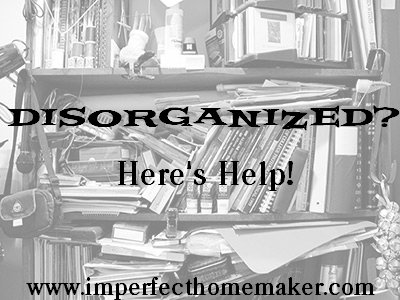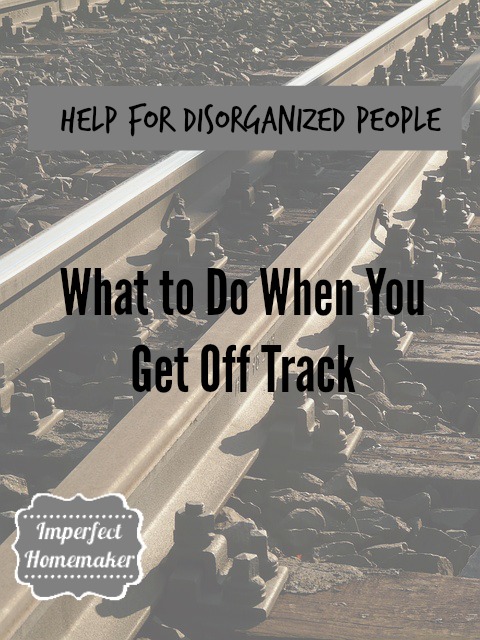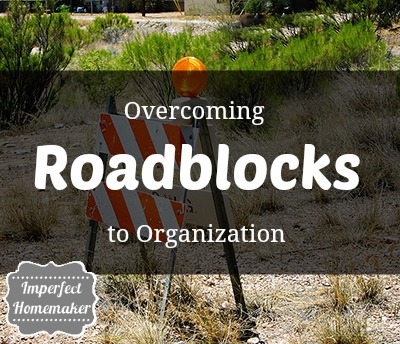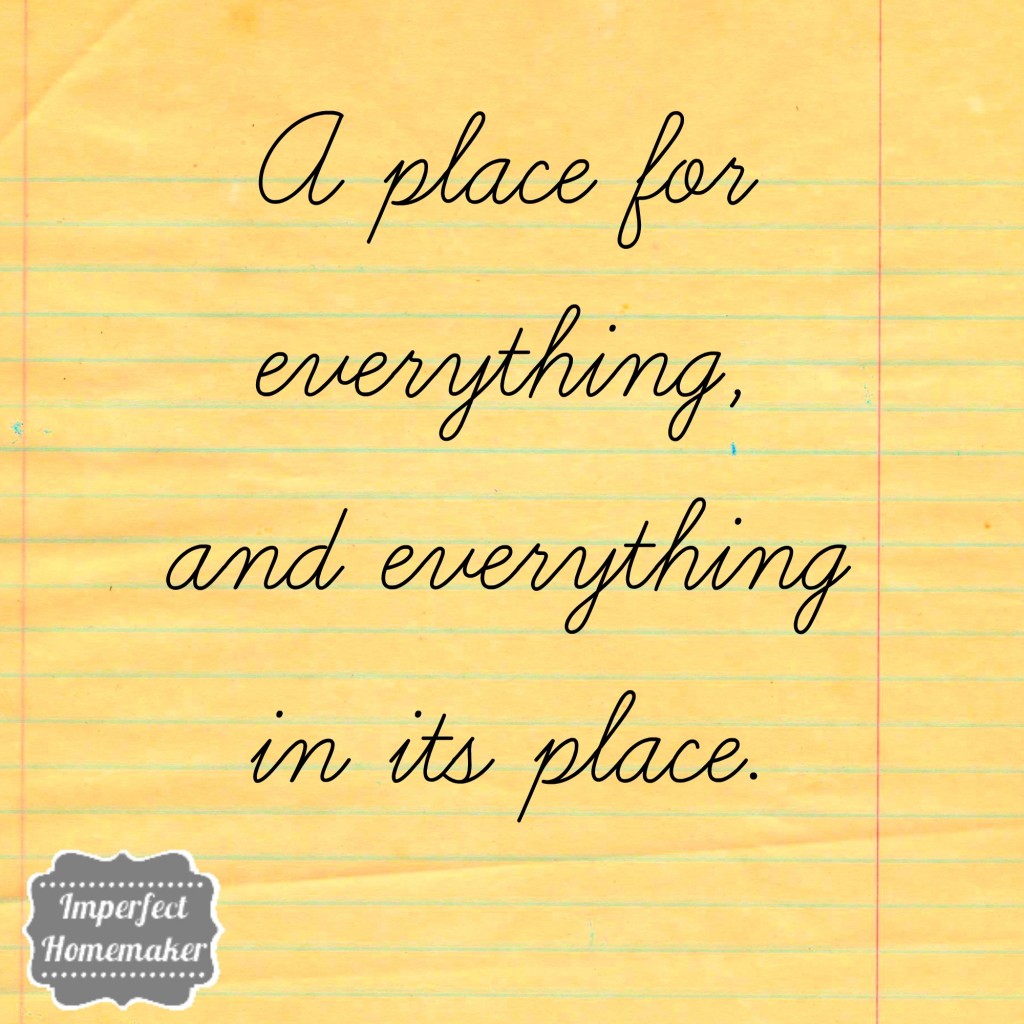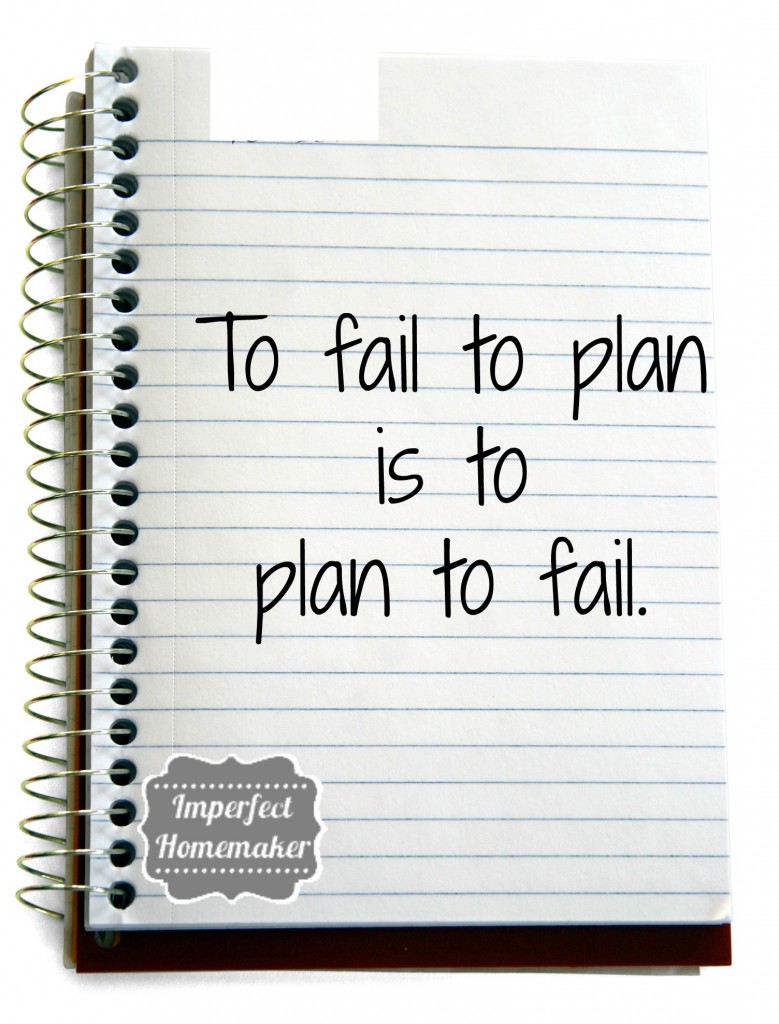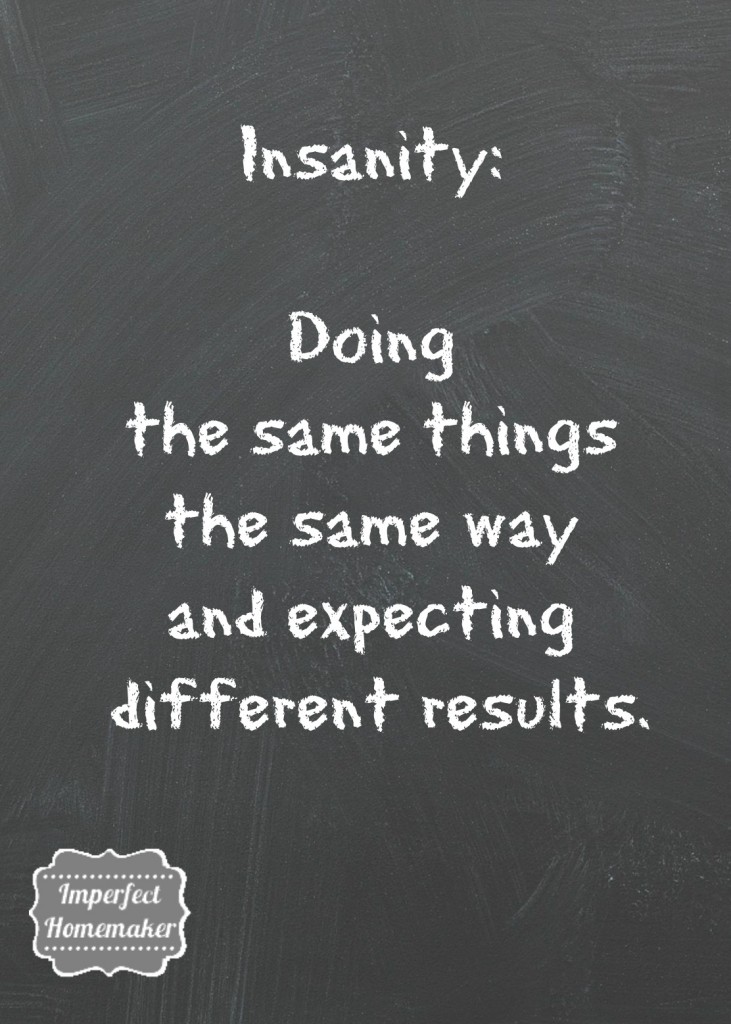Tools for Homemaking Productivity
I struggle with keeping things clean and orderly. My brain is constantly bursting with ideas, and I tend to be a little “ADDish”, flitting from one thing to the next and making a bunch of messes as I go.
(I named this blog Imperfect Homemaker for a reason!)
Anything to help my days be a little more productive is a big plus!
Here are some of the tools I use on a daily basis to help me have a little more accomplishment to show at the end of the day:
1. Clothes.
That would be as opposed to PJ's or loungewear. You'll get more done when you wear real clothes, I promise. When you wear PJ's or loungewear all day, you just feel like…well…lounging. Not good for productivity. (If you need some clothes at a good price, you should check out Thredup. It's like an online thrift store, which is great for this busy mom who doesn't have time to drag her kids to a real thrift store. Plus, you get a free $10 credit to spend when you sign up through my referral link here.)
2. Shoes.
Not just any shoes. Sneakers. (I actually grew up calling them tennis shoes. What do you call them? Oh, wait. I'm getting distracted again. Back to the point.)
If you put shoes on your feet, it helps you walk faster and get things done more quickly. Plus you don't ever have to stop and clean crumbs out of your toes or nurse a throbbing foot because you stepped on a lego.
Your shoes should be ultra-comfortable so that you can wear them all day long. I have these, and they have been one of the best purchases I've ever made. These are the most comfortable shoes for all-day wear I've ever owned.
3. Music
Listening to fast-paced music helps keep me going. And it's nice to have Christ-honoring music to think about as I work too. Old Christian Radio plays a lot of faster-paced music, and many of the songs on the CD that my husband and I recorded are fast-paced as well.
4. Rags and cleaners
Keeping rags and a bottle of cleaner in multiple places throughout the house makes my job a lot easier. Whenever someone spills something or makes a potty-training mess on the bathroom floor, I have what I need right at hand to clean it up immediately. I use my homemade non-toxic disinfectant as an all-purpose cleaner. It works so well for just about everything.
5. Air fresheners
There is something about things smelling clean that makes me want to keep things clean.
I'm sure this makes me a healthy living heretic, but I absolutely LOVE the smell of Downy Unstopables. When I'm walking through the laundry room I just want to stay there because it smells so good! (Does anyone know of a natural way to make the laundry smell that good? I hate using the chemicals on my clothes, and I try not to do it terribly often, but it just smells oh-so-good! And no, adding lavender drops to the wash is not a valid suggestion. It's fine, but just not the blow-me-away awesome smell that the Downy is. If you're awesome with essential oils and you have a recipe that you think will blow me away, I'd love for you to share!)
6. A Menu Plan
There is something about knowing at the beginning of the day what I am having for dinner that makes the entire day go more smoothly.
Sometimes I drop the ball and end up scrambling at dinner time. Not fun. But even more often than that, I get in a rut with meals. We end up having the same things over and over because I am just too tired to try to think of interesting meals.
I just discovered the coolest menu planning program. Really, really cool.
It's called Build a Menu. You choose the store where you normally shop, and then you're given recipe options for all different eating styles (for example: Clean Eating, Gluten Free, Budget Friendly, even Trim Healthy Mama!)
If you want to see exactly how it looks in action, take a look at this post.
The thing that makes Build a Menu so cool is that you get to decide what you want to make. Many menu planners give you a pre-made menu, but then it ends up being nothing that you or your family would like. With this you simply look through the recipes (breakfast, lunch, dinner, snacks, and desserts are all included!) and mark the checkboxes beside the ones you want to have that week. Boom! Your menu and shopping list are done, and it's exactly what you want to eat!
Which of these tools do you need to start using? What would you add to this list that helps you be more productive at home?
Help for Disorganized People: Getting Started
For the previous posts in this series, check out
{Help for Disorganized People: Part 1}
{Overcoming Roadblocks to Organization}
{Overcoming Roadblocks to Organization: Part 2}
{What to Do When You Get Off Track}
Now that you know what you need to do to get organized, you have to actually get started!
If you're having trouble getting started, it's very possible that you're making it harder than it has to be. A lot of us disorganized procrastinators tend to look at everything at once, which can be very overwhelming. Learning how to break things down into smaller chunks will help you get started a lot more easily. In fact, it's as easy as learning your ABC's.
A — Take Action
You've spent enough time learning; you know what to do. You're going to learn even more from doing than you are from reading about and thinking about doing something. So, take action today! Pick one small thing and go for it!
B — Break it Down
The way to truly “go for it” is to break everything down into smaller, doable chunks. Need to organize a room. Start by looking for all the trash in the room and throwing it away. You can do that. When that job is finished, choose one shelf to declutter. Don't start on another job until each thing is finished. Focus on one small task at a time. Before you know it, all those small tasks will add up to big success.
C — Create Momentum
Momentum simply means forward progress. In order to create forward progress you got started, you broke it down to small, workable chunks, and now you have to keep going! As you keep moving forward, everything you've done adds up to create bigger and larger success.
In Conclusion
Letting go of procrastination and getting organized is a critical skill to learn. It's far too easy to just let things pile up until you start facing overwhelm. But if you keep your aim high, and focus on the small picture, you can beat overwhelm and finally get organized. Getting organized will allow you to keep track of even more amazing ideas, enable you to get more from your ideas, drastically lower your stress, and help you waste less time!
What is the first small task you will do?
(And if you haven't already joined our Homemaking Challenges group, focusing on one small task at a time is exactly what we're doing! It's a lot more fun to work together with other homemakers who have similar struggles. Come join us!)
Help for Disorganized People: What to Do When You Get off Track
Last week I shared a number of tips to help you overcome your organizing roadblocks, but no matter how good your plan is you may occasionally find you have slipped back into old habits. Or perhaps something threw you off your schedule, such as illness or another emergency. However it happens, you will sometimes find yourself back into your old habits of disorganization and procrastination.
Here's what to do when you get off track:
• Don't give up — You can choose to let the interruption cause you to fall off the cliff or you can grab control and start from now climbing your way back up the mountain.
• Be honest with yourself — Determine what caused you to lose your focus. Are you overly tired; are you eating right; is something else wrong causing you to go back to your old ways of procrastination and disorganization? Or are you just being lazy?
• Start small — Tackle one small thing to get it reorganized. It's especially important to go back and reorganize the things you've already organized that have gotten off track. Don't tackle anything new until you've at least gotten back to where you were.
• Go back to your calendar — The easiest place to start is your calendar. If you've been writing things in it, even the minutia, then you should have a place to start right there in today's date. If not, start writing in your calendar again.
• Let go — Don't beat yourself up about falling off the path. The important thing is that you're willing to admit your mistakes and start again from where you are. Baby steps will get you there just as well as leaps and bounds.
• Do what works — If you've discovered a way to do something that works, stick to it. You don't need to reinvent the wheel or try to force someone else's methods upon yourself. If it works, it works; so do it! (Just be mindful that you're not letting disorganization and procrastination be what works!)
If you've gotten off track with your organization efferts, take heart! You've realized you have a problem and that fact alone will help you take the steps to correct it. You can take control again simply because you've accepted that you need to. Even if all you do is start with something small like organizing your purse, filling in your to-do calendar, or cleaning off your desk at work. The fact is, starting is half the battle.
Have you gotten off track with your organizing? Where do you need to start to put yourself back on?
Overcoming Roadblocks to Organization (Part 2)
Last week I challenged you to identify your bad habits, determine the good habits with which you can replace them, and choose one good habit you will begin implementing immediately.
Here are some more tips to help you get past those Roadblocks to Organization.
1. Purge Often — One sure way to get more organized is to get rid of things. You need a whole lot less than you think you do. (How many clothes can you wear at one time? How many toys can your children play with at one time? How many dishes can you eat off at one time?)
2. KISS — Keep it Simple, Sweetie! If you make things too complicated, you're not going to do them. That's why you want to look at what your current organization style is, and work with what you already have. There's no need to create some new, complicated system of organization. You just need to discipline yourself to have a place for everything (purge those things for which you can't find a place!), and to put things away immediately.
3. Clean Up Every Day — Use baskets to help you transport things to their “home”, but don't keep the things in the basket for weeks at a time. Take the basket with you whenever you leave a room.
5. Keep a Calendar — Writing things down is the best way to ensure that you get things done. You can use old-fashioned pen and paper or you can use a program like Evernote, Cozi, or Google Calendar. However you choose to keep your calendar, this is the one thing that will help you the most. (You can't just write things on it, though! You have to look at it every day!)
6. Forgive Yourself — No one is perfect, mistakes will happen, backsliding will happen, and your organization might get off track. Just stay aware.
Which of these do you most need to work on?
Overcoming Roadblocks to Organization
Once you have determined the reasons you procrastinate and have identified your organizing style, it's time to overcome your personal roadblocks and stop the excuses.
Failing to plan is planning to fail. If you don't plan for success based on your own personality and way of doing things, you will continue to be frustrated and disorganized.
Sometimes disorganization or procrastination is the result of your circumstances (lack of time, lack of money, etc.) Sometimes it's simply your personality. Either way, you must determine what your personal roadblocks are and make a plan to overcome them.
The best way to fix a bad habit is to replace it with a good habit.
Your task for today is to do the following:
Take out a sheet of paper and divide it into two columns. On one side make a list of the bad habits you need to change. On the other side write down the good habit with which you should be replacing each bad habit. However, make sure the good habits are still in keeping with your own personality. Don't try to make someone else's organizational methods work for you.
For instance, if you are a “Piles Polly”, always piling things around the house so you won't forget to deal with them, make a designated place to pile those things. Use a basket or inbox to hold bills that need to be paid or other mail that needs to be sent. Instead of piling things on the counter or coffee table that need to be put away in another room, use a large basket to hold those items and carry it with you when you leave the room.
The “Basket Betty” can continue to use her basket methods with just a couple minor tweaks. Instead of just keeping things in baskets to keep them out of sight, label each basket to hold one category (bills to be paid, items to be put away in another room, items to be donated, etc.) Then you won't have to rummage through several baskets to find what you need.
“Neat Nelly”, who keeps everything hidden out of sight in closets, can continue to do so as well. However, she should do a thorough de-cluttering, keeping only a few items. To keep things neat and organized, you should keep much less in a space than what actually fits in there. When you stack things one on top of another or have to reach behind things to get to something else, you end up toppling things over and creating a disorganized mess. Once you've determined how much can fit into your closets or cupboards without stacking or layering items, do not allow yourself to add anything else to your collection unless you get rid of something else.
Once you've made your list, choose one (just one!) habit that you're going to implement this week. Don't try to change everything all at once or you will get overwhelmed and give up!
Leave me a comment and tell me what habit you're working on this week!
Help for Disorganized People (Part 2)
As we continue our series on Time Management and Organization for the Disorganized Procrastinator (read part 1 here), let's take a look at some common reasons for procrastination.
Pretty much everyone suffers from procrastination tendencies in at least one aspect of their lives, whether it's getting work done, doing household chores, or exercising. (Wouldn't it be great if we procrastinated about eating that delicious chocolate brownie as much as we do about exercising?)
When you procrastinate on certain things, you're getting some sort of payoff for the behavior. You're avoiding the pain of doing the task right now. Maybe you realize that it may cause you pain later, but you put that out of your mind. What you're concerned with right now is avoiding the pain now. Pain felt later is not real yet.
So what are some of the reasons we procrastinate?
1. Fear of Failure
This is the most obvious reason people procrastinate. The fear that you won't succeed is so strong that you'd rather not try at all. Your mind tells you that you're not a failure because you didn't do it yet. Many people who fear failure have perfectionist tendencies. Perfectionism is really just a cover and an excuse for not ever finishing anything due to the fear of failure.
2. Fear of Success
Believe it or not, some people procrastinate due to a fear of success, the inverse of fear of failure. If you have an innate feeling that you don't deserve success and lack confidence in your ability to continue being successful, you will procrastinate. Once you are on top, it's harder to stay on top, so why get to the top at all? Fear of being able to repeat success can block you from ever experiencing success in the first place.
3. Addiction to the Rush
This is something that often happens to college students or people who work with deadlines. They wait until the last minute and the extra adrenaline that is produced makes them feel good. They get addicted to the adrenaline and seek reasons to flood their body with it again, and again. Adrenaline junkies often believe they do better work at the last minute, which could not be further from the truth. If you perform at a high level at the last minute, imagine how well you would do with a real plan of action?
4. Lack of Interest
Some things you put off because you simply don't like to do them. That could be cleaning out the oven or the fridge, matching socks, or working on a report for work or school. Those things are boring, so you procrastinate because you simply do not want to do it to start with. You wait until the very last moment to do it. Maybe you're even late with it or don't do it at all.
5. You Need Training
Some people procrastinate because they really aren't sure how to do something. They need someone to train them how to do it right. It doesn't matter if it's household organizing, work related tasks, or something else entirely — if you tend to procrastinate about something, ask yourself if you are procrastinating because you don't know how to do it.
6. You Don't Like to Say No
By putting off doing things you've committed to do, it's your way of saying no without saying no. If you're a person who doesn't like to say no just because you're trying to be nice, but then you put off doing what you've agreed to do — I hate to tell you, but you're not being nice! Just be honest and don't commit to things with which you cannot follow through.
7. You're Overwhelmed
It's not uncommon to start putting things off when you simply get in over your head. Due to poor organizational ability, you simply bit off more than you could chew. Plus, you lack the training to chunk together actionable steps to beat the feeling of overwhelm. When you're overwhelmed, it seems easier to just ignore anything that needs to be done.
8. You're a Dreamer & a Talker
Many people who are otherwise great people tend to love to talk about doing, rather than actually doing. The problem with this is that if you never follow up with doing what you're talking about, you'll never achieve success. You'll always just be a talker and a dreamer. Spending time making vision boards on Pinterest feels productive, but if you don't back that up with some action, you're not productive. You're all talk and no action.
9.Inability to Visualize Success
Some procrastinators have serious problems with creating a picture in their minds of future success. You let your past inform your future too much. You just cannot see yourself being successful at anything, so you put off trying and put off doing your best because you just can't see yourself beyond where you are right now.
Next week, we'll talk about how to overcome these roadblocks.
But for this week's challenge, I want you to identify:
1. One thing that you've been putting off.
2. The reason you've been procrastinating.
Leave a comment and let me know what you determined!






